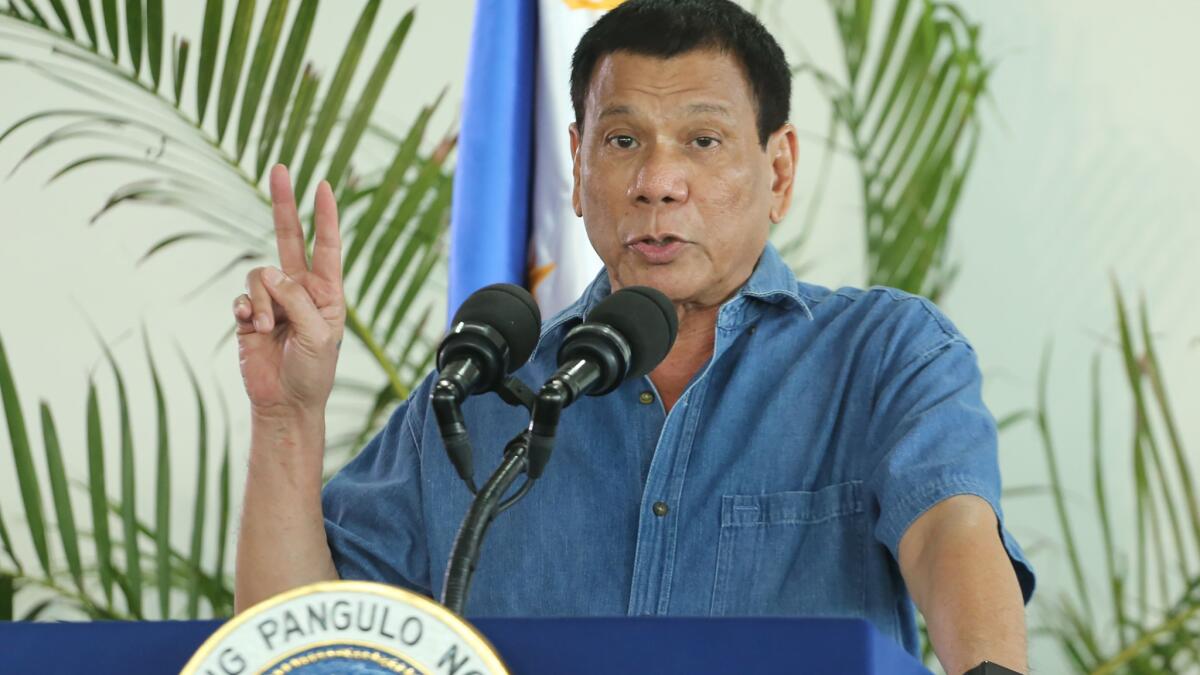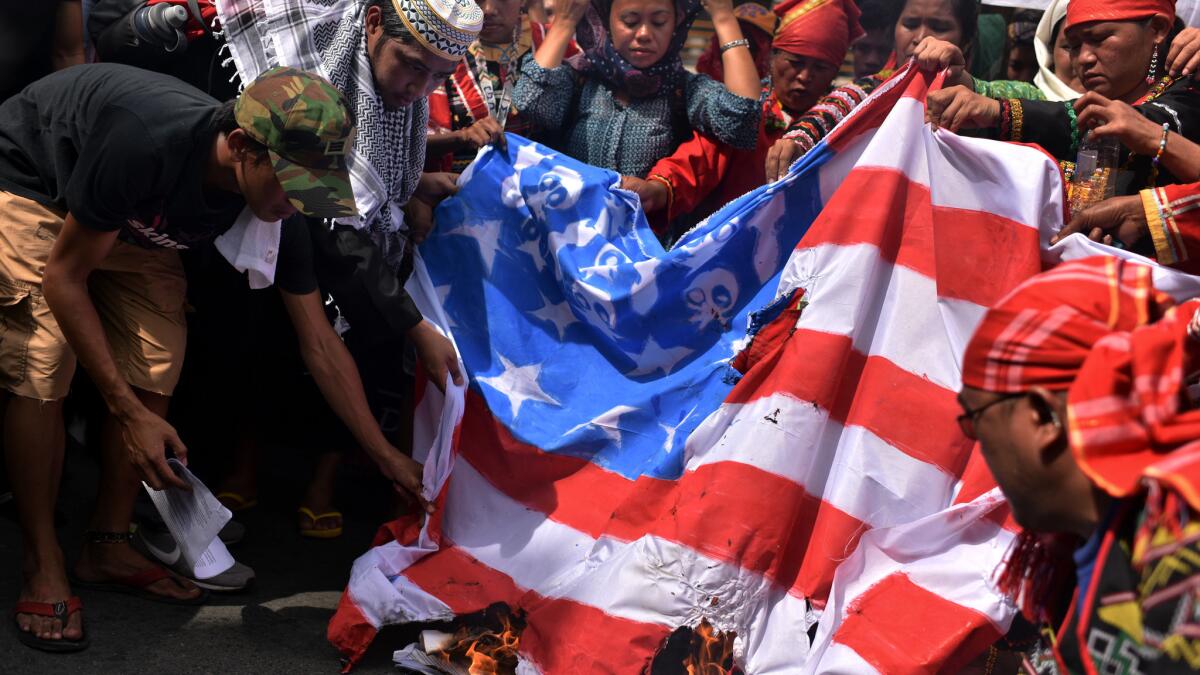Break away from the U.S.? Here’s what Philippine officials say Duterte really meant to say

Philippine President Rodrigo Duterte’s divorce from the United States may have ended before it began.
On Thursday, Duterte, while in Beijing on a state visit, announced a “separation” from the U.S. by the Philippines — a top U.S. ally since the 1950s — in favor of closer economic and military ties with China.
“America has lost now,” Duterte, 71, told a crowd of Chinese and Filipino business leaders in the Great Hall of the People, a stately meeting hall abutting Tiananmen Square. “And maybe I will also go to Russia to talk to Putin and tell him that there are three of us against the world: China, Philippines and Russia. It’s the only way.”

Then came the damage control.
Duterte seemed to scramble early Saturday, saying he will not cut diplomatic ties between the Philippines and the U.S.
“It’s not a severance of ties. What I mean was a separation of foreign policy,” he told reporters in his home city, Davao, according to the Philippine news website GMA News.
“Let me clarify. The president did not talk about separation,” Philippines Trade Minister Ramon Lopez told CNN Philippines on Friday, joining a small chorus of high-ranking Philippine officials and elites to denounce, walk back, or express bafflement at their president’s words.
The country “would not stop trade and investment with the U.S.,” Lopez said.
Four Philippine senators sought “clarification” on Duterte’s comments, according to the Philippine Daily Inquirer. Presidential spokesperson Ernesto Abella called Duterte’s remarks merely “an assertion that we are an independent and sovereign nation, now finding common ground with friendly neighbors.”
Duterte, in a meeting with Chinese President Xi Jinping on Thursday afternoon, agreed to resume bilateral talks over the South China Sea, where competing territorial claims have poisoned the two countries’ relationship for years.
The Philippine president, for his rapprochement, walked away from the meeting with $13.5 billion worth of trade deals with China.
“In this visit, bilateral relations have fully recovered and the two countries will return to the track of dialogue and consultation to address maritime issues,” Chinese Vice Foreign Minister Liu Zhenmin told reporters after the signings.
Yet Duterte’s comments have caused some blowback at home, where many citizens view the U.S. favorably and hold China in deep contempt. On Friday, Albert del Rosario, the Philippines’ former foreign minister, called Duterte’s shift in foreign policy a “national tragedy.”
“We must be with responsible nations with whom we share our core values of democracy, respect for human rights and the rule of law,” he said in a statement. “To stand otherwise, is not what Filipinos are; it is not what we do; it is not what is right.”
U.S.-Philippine economic, military and grassroots ties run deep. The countries’ military relationship dates to a defense treaty signed in 1951, and the U.S. operates several military bases on Philippine territory. U.S. companies have invested nearly $5 billion in the country, especially in the call center and data processing industries. About 2.6 million Filipinos live in the U.S.
Duterte has vowed to end joint military exercises and naval patrols in the South China Sea and called for U.S. forces to leave the southern island of Mindanao, where the Philippines is combating several terrorist and separatist groups.
Yet Duterte has a reputation for making crude, hyperbolic and self-contradicting statements, leaving politicians — both in the U.S. and the Philippines — unsure of what he actually hopes to achieve. He has hurled profanity at Obama, the European Union and the pope; he has apologized, then doubled down on his insults.
During his presidential campaign this spring, Duterte said that he would shelve concerns over the South China Sea in return for Chinese economic aid; then he vowed to personally ride a jet ski to contested islands and adorn them with a Philippine flag.
Also during the campaign, Duterte promised to solve the country’s endemic drug problem by declaring open season on anyone involved in the drug trade, without regard for human rights or due process. Since his June 30 inauguration, thousands have lost their lives.
The U.S. has repeatedly criticized Duterte’s anti-drug campaign; China has only praised it.
U.S. officials have said that Manila has not notified them of any policy changes.
“We’ve seen a lot of this sort of troubling rhetoric recently which is inexplicably at odds with the warm relationship that exists between the Filipino and American people and the record of important cooperation between our two governments,” said the U.S. Embassy press attache in Manila, Molly Koscina, in a statement.
“For our part, we will honor our alliance commitments and treaty obligations,” she continued. “And of course, we expect the Philippines to do the same.”
ALSO
South Africa quitting international court created to prosecute world’s worst criminals
Islamic State fighters attack a police compound and power plant 95 miles south of Mosul
As tensions over Taiwan’s national identity reignite, tourists from mainland China avoid the island
More to Read
Start your day right
Sign up for Essential California for news, features and recommendations from the L.A. Times and beyond in your inbox six days a week.
You may occasionally receive promotional content from the Los Angeles Times.






